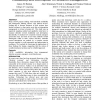Free Online Productivity Tools
i2Speak
i2Symbol
i2OCR
iTex2Img
iWeb2Print
iWeb2Shot
i2Type
iPdf2Split
iPdf2Merge
i2Bopomofo
i2Arabic
i2Style
i2Image
i2PDF
iLatex2Rtf
Sci2ools
91
Voted
CHI
2002
ACM
2002
ACM
"I'd be overwhelmed, but it's just one more thing to do": availability and interruption in research management
Many CSCW projects dealing with individual availability and interruption filtering achieve only limited success. Perhaps this is because designers of such systems have limited evidence to draw upon; most data on interruption management is at least a decade old. This study uses an empirical sampling method and qualitative interviews to examine attitudes toward availability and interruption. Specifically, we analyze how corporate research managers spend their time and look at how their attitudes toward interruption relate to their various activities. Attitudes toward interruption are marked by a complex tension between wanting to avoid interruption and appreciating its usefulness. We conclude by discussing the implications of these findings for design, suggesting that the notion of socially translucent systems may be a fruitful approach. Keywords CSCW, availability, interruption, time management, attention economy, managers, social translucence
CHI 2002 | Human Computer Interaction | Interruption Filtering Achieve | Interruption Management | Many CSCW Projects |
| Added | 01 Dec 2009 |
| Updated | 01 Dec 2009 |
| Type | Conference |
| Year | 2002 |
| Where | CHI |
| Authors | James M. Hudson, Jim Christensen, Wendy A. Kellogg, Thomas Erickson |
Comments (0)

